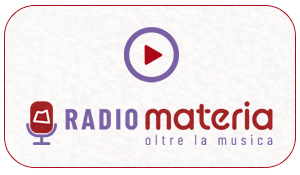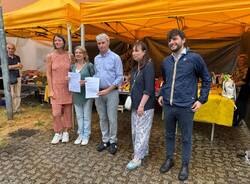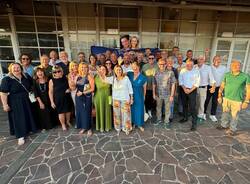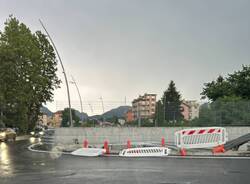A map against littering
The first report on littering, on the border between Italy and Switzerland has been presented. After the experimental phase involving only councils, everyone will soon be able to take photos and make reports. In Switzerland, SF 111 is spent per capita on cleaning up litter.
 If you go for a walk in the woods and you discover litter, you can now take a photograph, report it to the foresters, and post it on the Web. The campaign to stop littering has started using technology and the Web. This is not science fiction, but an initiative that will soon be possible, thanks to the WEB-GIS project, which was presented today, in Mendrisio, during a conference, where the first report to stop littering, between in the border region between Italy and Switzerland was illustrated. To understand the extent of what we are talking about, here are a few figures from our neighbours, who are traditionally known for their cleanliness.
If you go for a walk in the woods and you discover litter, you can now take a photograph, report it to the foresters, and post it on the Web. The campaign to stop littering has started using technology and the Web. This is not science fiction, but an initiative that will soon be possible, thanks to the WEB-GIS project, which was presented today, in Mendrisio, during a conference, where the first report to stop littering, between in the border region between Italy and Switzerland was illustrated. To understand the extent of what we are talking about, here are a few figures from our neighbours, who are traditionally known for their cleanliness.
Every year, in Switzerland, collecting and disposing of litter costs SF 111 per capita. Thus, the habit that people have of getting rid of what they do not need anymore in the most barbaric of ways for the environment is not limited to one nation. This has been confirmed by the Swiss themselves, from the director of the Country Department of Canton Ticino, Marco Borradori, who is shocked by the bad habits of many people on the roads, even in Canton Ticino, to the news that talks about cows that died while grazing because of cans thrown into the fields, which became razor sharp, after being cut open when the grass was mown.
So, what do we do? Declare war against littering, using smart phones and the Internet, creating a map of the area and a database that the police forces can use to fine people, and that councils can use to understand what policies they should implement, and where they should focus their attention. The system is called WEB-GIS, and it has been in the experimental stage for a year, in 11 towns and villages in Canton Ticino, and in 72 in Varese Province. The first step involved the councils, and it will soon be available also for the people. Any littering that is discovered, will be reported, and the forces of law and order will then have to carry out inspections and put it on the record. As mentioned, the project was presented during the report “Insubria unlimited cleaning”, which concerns one of the strengths of the “Modus Reciclandi” program, of which the Integrated Cross-border Program is a part, promoted by the European Union and Lombardy Region, in which Varese Province and Canton Ticino collaborate to find new ways of increasing responsibility in relation to waste matters. Varese Province, the leader of this project, was represented by the Councillor Luca Marsico, who spoke about the good levels of separate waste collection achieved in Varese Province. “We’ve reached 61%, and the aim is to get to 65%; the goal of achieving a 3% reduction in waste production has been achieved.” The report on the situation of littering was presented by Giorgio Ghiringhelli, the director of the company ARS Ambiente Srl, and the coordinator of the “Insubria unlimited cleaning” project. “Both the quality and the quantity of litter has varied for decades; for example, packaging as increased, given that many products were once sold loose. Today, there’s more plastic. But one important achievement, the result of a big public awareness campaign, is the separate waste collection,” said Ghiringhelli. “Just consider organic waste. In 2000, only 12 councils, in Varese Province, made separate organic waste collections. In 2009, as many as 141 councils did. Today, with this project, which we’ve presented, it will also be possible to do something about littering, giving everyone a chance to contribute actively to the map of decay; this tool will help not only Italy, but also our friends in Canton Ticino.” The publication contains several ideas concerning the environment, ranging from a regulatory study, identifying reference norms, concerning offences, the penalty system, assessment methods, evacuation orders, and the involvement of the Voluntary Ecological Guards. And there is even a “psychological” study: how man relates to waste, and when an item becomes waste. It was decided that administrators should have a tool that enables discovering and guarding the areas most affected by littering, in order to prevent the consequences of the “broken window theory”, according to which, decay attracts further decay, if nobody does anything.
La community di VareseNews
Loro ne fanno già parte
Ultimi commenti
Emanuele Zanetti su Motociclista di Ferno ucciso da un orso in Romania
GrandeFratello su Superate le 700 firme per la petizione sul recupero del Grand Hotel Campo dei Fiori di Varese
Felice su Motociclista di Ferno ucciso da un orso in Romania
Stefano64 su Neil Young torna dopo l'enorme successo di Harvest: ma non è il disco che tutti si aspettano
Alessandro Zanzi su Superate le 700 firme per la petizione sul recupero del Grand Hotel Campo dei Fiori di Varese
Felice su La bibliocabina, la panchina e il cane che fa pipì. A Fagnano Olona scoppia la polemica
















Accedi o registrati per commentare questo articolo.
L'email è richiesta ma non verrà mostrata ai visitatori. Il contenuto di questo commento esprime il pensiero dell'autore e non rappresenta la linea editoriale di VareseNews.it, che rimane autonoma e indipendente. I messaggi inclusi nei commenti non sono testi giornalistici, ma post inviati dai singoli lettori che possono essere automaticamente pubblicati senza filtro preventivo. I commenti che includano uno o più link a siti esterni verranno rimossi in automatico dal sistema.